Empowering Lives of our Diverse Communities, One Driver Licence at a Time
On its 4th year, a community driving school operated by the Migrant Action Trust in collaboration with local community groups through The PETER Collective is empowering the lives of our diverse communities, one driver licence at a time.
This year the Puketapapa Community Driving School (PCDS) successfully trained over 200 migrants and former refugees towards gaining their restricted and full driving tests. Before the August 2021 lockdown, 97 programme participants passed their practical tests and are now able to access New Zealand’s roads safely and independently, while also increasing their chances to get jobs and reducing social isolation.
One of our biggest success stories in 2021 was helping Amino, a young Somali single mum to get her restricted licence. Being deaf didn't stop her from learning. Thanks to our most patient instructors and volunteer mentor Kevin, who offered sign language support, Amino got her restricted licence last May.
“Our refugee-background learners face financial, literacy and language barriers. Getting a licence means a world of difference for all of them,” says Amie Maga, PCDS Manager.
Rina Capila, PCDS instructor shared her experience teaching an Afghani single mum: “I had tears of joy when she passed. She doesn't understand English, so I tried to use google translation for her to understand my instructions. I draw and even walk with her around the intersections for her to understand what safe driving is. Her struggles as a single mum and refugee touched me a lot, and I know having a licence will ease the burden.”
“The feedback from our learner drivers is truly heart-warming so we’d like to help more urgent referrals from our diverse communities as much as we can. As a community-owned social enterprise, we deliver driving lessons for those who can afford to pay the full costs, then use the income to give subsidised driving lessons for learners who face multiple barriers,” Maga explained.
“A driver's licence is important to me because I am a student and responsible for my children. You can't imagine the hassles of getting kids to school and going to university daily, plus using Uber for emergency and hospital appointments. Now things are much easier. I feel free to move anytime and anywhere. I can't forget last year's lockdown. It was hard to find someone to take me to buy food and supplies."- Hanan
“I was able to help my mum during lockdown. My mum is a health worker, and she can’t take bus all the time. So it was my duty to drop her to work. Now I can drive alone buy some groceries and stuff. This is a little bit help for my family. Driving was my first step to help my family.” - Serene
“I’ve been able to help my family more like getting groceries, dropping off my brother and picking up from school. From a personal perspective it has given a lot of confidence. As a young person, whenever you are with your friends, there is a stigma of you still having your learner’s. I chose to enrol at PCDS as I always thought the social enterprise side of the business is amazing. The buy one and give one for someone with refugee background and struggling to afford a driving lesson was really cool. I really like the fulfilment it gave me that my money would be going towards someone in need and potentially make a difference in their lives.” – Nina
“Before I just ride a bus. Sometimes the bus would take a while, so it was hard for me especially going home late. Now I’m working as a support worker. I drive a lot going to my clients’ homes. Excellent cause, you are really helping the migrants and refugees to learn to drive.” - Christine
PCDS also supports the Road to Zero strategy of Waka Kotahi for a New Zealand where no one is killed or seriously injured in road crashes. To book driving lessons and/or donate towards subsidised lessons for former refugees, please check out pcds.co.nz

Poll: Should the government levy industries that contribute to financial hardship?
As reported in the Post, there’s a $30 million funding gap in financial mentoring. This has led to services closing and mentors stepping in unpaid just to keep helping people in need 🪙💰🪙
One proposed solution? Small levies on industries that profit from financial hardship — like banks, casinos, and similar companies.
So we want to hear what you think:
Should the government ask these industries to contribute?

-
61.4% Yes, supporting people is important!
-
22.5% No, individuals should take responsibility
-
16.1% ... It is complicated
A Neighbourly Riddle! Don’t Overthink It… Or Do?😜
Do you think you know the answer? Simply 'Like' this post if you know the answer and the big reveal will be posted in the comments at 2pm on the day!
If you multiply this number by any other number, the answer will always be the same. What number is this?

17 yr old looking for after school job please
Hi
I'm looking for any type of part time work for my son.
Hes a lovely guy with a good attitude towards hard work.
Anyone that could help id love to chat
0274547423





 Loading…
Loading…